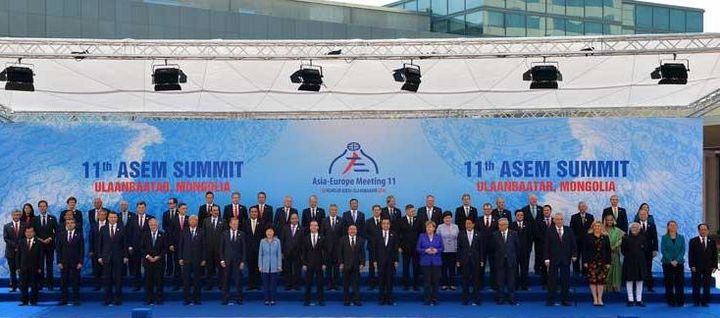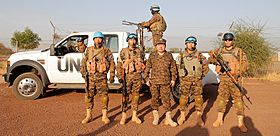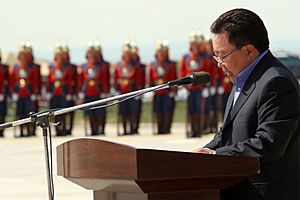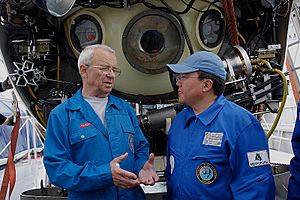Tsakhiagiin Elbegdorj facts for kids
Quick facts for kids
Elbegdorj Tsakhia
|
|
|---|---|
|
Цахиагийн Элбэгдорж
|
|
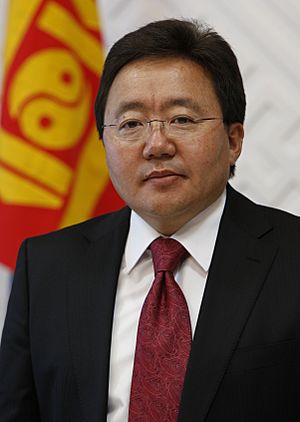
Official portrait, 2009
|
|
| 4th President of Mongolia | |
| In office 18 June 2009 – 10 July 2017 |
|
| Prime Minister |
|
| Preceded by | Nambaryn Enkhbayar |
| Succeeded by | Khaltmaagiin Battulga |
| 18th Prime Minister of Mongolia | |
| In office 20 August 2004 – 13 January 2006 |
|
| President |
|
| Preceded by | Nambaryn Enkhbayar |
| Succeeded by | Miyeegombyn Enkhbold |
| In office 23 April 1998 – 9 December 1998 |
|
| President | Natsagiin Bagabandi |
| Preceded by | Mendsaikhany Enkhsaikhan |
| Succeeded by | Janlavyn Narantsatsralt |
| Deputy of the People's Great Khural | |
| In office 1990–1992 |
|
| Member of the State Little Khural | |
| In office 1990–1992 |
|
| Member of the State Great Khural | |
| In office 1992–1994 |
|
| Constituency | Khövsgöl Province |
| In office 1996–2000 |
|
| Constituency | Bayankhongor Province |
| In office 2008–2009 |
|
| Constituency | Ulaanbaatar, Chingeltei district |
| Personal details | |
| Born | 30 March 1963 Zereg, Mongolian People's Republic |
| Political party | Democratic |
| Other political affiliations |
Democratic Union (until 2000) |
| Spouse | Khajidsuren Bolormaa |
| Children | 25 (21 adopted) |
| Alma mater |
|
| Signature |  |
| Military service | |
| Allegiance | Mongolian People's Republic |
| Branch/service | Mongolian People's Army |
| Years of service | 1982–1983 |
Elbegdorj Tsakhia (Mongolian: Цахиагийн Элбэгдорж; born 30 March 1963) is a Mongolian politician and journalist. He served as the President of Mongolia from 2009 to 2017. Before that, he was the Prime Minister of Mongolia twice, in 1998 and again from 2004 to 2006.
Elbegdorj was a key leader in the 1990 Mongolian democratic revolution. This movement ended 70 years of communist rule in Mongolia. He also helped write the country's 1992 constitution. This important document brought democracy and a free market economy to Mongolia. His supporters call him a "freedom fighter" and the "Golden Sparrow of Democracy." This name suggests he brought new hope and change, like spring after a long winter.
Today, Elbegdorj is a member of The Elders. This group was started by Nelson Mandela in 2007. They work for peace, justice, human rights, and a healthy planet. He is also part of Club de Madrid, which promotes democracy worldwide. He works to end the death penalty and is a vice chairman of the International Democracy Union.
During his time as president, Elbegdorj focused on many important issues. These included fighting corruption, protecting the environment, and promoting women's rights. He also worked on judicial reform, getting people involved in government, and making the economy more open. He helped get rid of the death penalty in Mongolia.
Elbegdorj started Ardchilal (meaning Democracy), Mongolia's first independent newspaper. He also helped create Eagle TV, the country's first independent television station.
Contents
- Early Life and Learning
- Leading the Democratic Movement
- Journalism Work
- Work in Parliament
- Prime Minister of Mongolia
- 2009 Presidential Election
- 2013 Presidential Election
- Presidency
- After the Presidency
- Family and Personal Life
- Awards and Honors
- Images for kids
- See also
Early Life and Learning
Elbegdorj was born on March 30, 1963, in Zereg sum, Khovd province. He grew up in a family that moved with their animals, called a nomadic herding family. He was the youngest of eight sons. As a child, he spent much time herding animals in the mountains. His father, Mongolyn Tsakhia, was a soldier who fought in a border conflict in 1939. Elbegdorj finished primary and middle school in 1979. His family then moved to Erdenet City, where he finished high school in 1981.
Army Service and Studies Abroad
From 1981 to 1982, Elbegdorj worked as a machinist at a copper mining plant. In 1982, he joined the military. He wrote poems for the army newspaper Ulaan Od (Red Star). Army leaders were impressed by his writing and his leadership in a youth group. Because of this, he got the chance to study military journalism in Ukraine. He studied at the USSR's Military Political Institute (now Hetman Petro Sahaidachnyi National Ground Forces Academy) from 1983 to 1988. He learned about journalism and also about Marxism–Leninism. After graduating, he worked for the Ulaan Od newspaper.
Studying at Harvard
After his first time as prime minister, Elbegdorj studied at the University of Colorado Boulder for a year. Later, he received a full scholarship to Harvard University. He earned a Master of Public Administration (MPA) degree from Harvard's John F. Kennedy School of Government in 2002.
Leading the Democratic Movement
While studying in the USSR, Elbegdorj learned about new ideas like Glasnost. This meant more freedom of speech and economic choices. When he returned to Mongolia, he met others who thought like him. They wanted to share these ideas with more people. This was difficult because the government at the time was communist and tried to stop such ideas.
On November 28, 1989, Elbegdorj spoke at a meeting for young artists. He said that Mongolia needed democracy. He asked young people to work together to make it happen. He spoke about supporting freedom and openness. The meeting chairman tried to stop him, as Mongolia had been a communist country for 68 years.
After his speech, two young people met Elbegdorj. They agreed to start a democratic movement in secret. They later met with ten other people. These thirteen individuals became known as the "Thirteen Leaders of Mongolia's Democratic Revolution." Elbegdorj's boss warned him not to get involved in activities outside of work. But Elbegdorj and his friends continued to meet secretly. They discussed democracy and a free market economy. They planned a public demonstration.
On December 10, 1989, the first public pro-democracy protest took place in Ulaanbaatar. There, Elbegdorj announced the creation of the Mongolian Democratic Union. This group asked the government for real changes. They wanted a system with many political parties and full human rights. In the following months, Elbegdorj and other activists organized more protests and hunger strikes. They also led strikes by teachers and workers. More and more Mongolians supported them.
After many large demonstrations, the government's leaders, the Mongolian People's Revolutionary Party's Politburo, agreed to talk. On March 9, 1990, the chairman, Jambyn Batmönkh, decided to step down. This opened the way for Mongolia's first multi-party elections. Elbegdorj shared this important news with the hunger strikers and the crowd on Sükhbaatar Square. Mongolia became the first country in Asia to successfully change from communist rule to democracy. Elbegdorj served as the leader of the Mongolian Democratic Union from 1989 to 1997.
A documentary film called "Man of the People" was made about President Elbegdorj. It tells the story of Mongolia's historic change to democracy.
Journalism Work
From 1988 to 1990, Elbegdorj worked as a reporter for Ulaan Od, the newspaper of the Mongolian Armed Forces. He also led an army literature group. In these roles, he wrote articles about the army, suggesting ways to make it better.
In 1990, Elbegdorj started Mongolia's first independent newspaper, Ardchilal (Democracy). He was its first editor-in-chief. This newspaper was very important in helping the country's democratic revolution succeed. He also helped bring freedom of the press to Mongolia. He played a key role in passing the Law on Press Freedom in 1998.
Elbegdorj also helped create Eagle TV in 1994. This was Mongolia's first independent TV station.
Work in Parliament
Elbegdorj was elected to the Parliament four times: in 1990, 1992, 1996, and 2008. As a Member of the People's Congress, he helped write and approve Mongolia's new Constitution on January 13, 1992. This new Constitution guaranteed human rights, democracy, freedom of religion, and free speech. Some people called Elbegdorj "Mongolia's Thomas Jefferson" because of his role in shaping the country's laws.
As chairman of the Democratic Party, Elbegdorj helped lead the Democratic Union Coalition to a big win in the 1996 parliamentary elections. He served as the Majority Leader of the State Great Hural (Parliament) from 1996 to 2000. He was also the Vice Speaker of the Parliament from 1996 to 1998.
In 1991, Elbegdorj started Mongolia's first Entrepreneurs Association. This group helped give livestock (farm animals) to herders for free from the old socialist farms. This meant that almost half of Mongolia's population received their first private property. He also supported selling state-owned businesses and land to private owners.
Elbegdorj led the State Commission on Rehabilitation. In this role, he made the government apologize to the victims and families of over 36,000 people. These people had been harmed or killed during the time of communist rule. He helped pass the Rehabilitation Law. This law gave support and payments to survivors and families of political victims. It also helped the country recover from past injustices and stopped future human rights violations. The law also created a Memorial Day for Political Victims.
Elbegdorj was also a member of the Democratic Party's National Counseling Committee from 1994 to 2009. He was the leader and chairman of the Democratic Party at different times. He also chaired the Democratic Union Coalition from 1996 to 2000.
Prime Minister of Mongolia
Elbegdorj served as the prime minister of Mongolia twice: in 1998 and from 2004 to 2006.
First Term as Prime Minister
In 1998, a rule in the constitution was changed. This allowed members of parliament to also serve in the government's cabinet. So, on April 23, 1998, Parliament elected Elbegdorj as prime minister. During his first term, Elbegdorj worked to solve economic and political problems. He helped create the Law on Press Freedom, which was passed in 1998. This law led to another law that changed state newspapers into public newspapers. This meant the government could no longer directly control or censor them.
One of Elbegdorj's biggest achievements was collecting taxes. The main source of income for the government was the Erdenet Mining Corporation (EMC). This company was partly owned by Mongolia and Russia. EMC had not paid its taxes to Mongolia from 1997 to 1998. This caused the government to have serious money problems. The previous prime minister had resigned because of this.
After becoming prime minister, Elbegdorj ordered a check of EMC's finances. The check showed that the money owed to the state was going to other accounts. This was a case of money being taken unfairly. Elbegdorj removed EMC's chairman. After this, the government started receiving its proper taxes and income from EMC.
Elbegdorj also decided to sell the state-owned Reconstruction Bank. This bank was losing a lot of money and was a big problem for the economy. Golomt Bank was the only one that offered to buy it. However, the Parliament stopped Elbegdorj's government from selling the bank. The bank later went bankrupt, causing a huge financial loss for the government. This showed that Elbegdorj's decision to sell it was correct. Elbegdorj also helped fund the completion of Mongolia's first Wrestling Palace. He remained prime minister until December 9, 1998.
Second Term as Prime Minister
On August 20, 2004, Elbegdorj became prime minister for the second time. This time, he led a government made up of two main political groups. The Democratic Coalition and the Mongolian People's Revolutionary Party had an equal number of votes in the parliamentary elections.
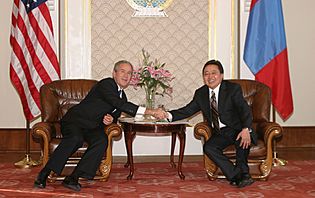
U.S. President George W. Bush visited Mongolia on November 21, 2005. He praised Elbegdorj as a democratic leader. President Bush wrote to Elbegdorj, "The world needs more people such as yourself who are willing to admire liberty."
During Elbegdorj's time as prime minister, the state-controlled National State Television and Radio became independent public organizations. This happened on January 27, 2005. Also, rules that stopped protests on Ulaanbaatar's Sükhbaatar Square were removed on November 17, 2005.
In his second term, Elbegdorj declared a fight against corruption and poverty. He saw these as the biggest problems for Mongolia's economy. His government signed the United Nations Convention Against Corruption in April 2005. His team also uncovered a corruption case involving the Customs chairman. This case involved millions of dollars.
Elbegdorj tried to help Mongolian businesses. He removed many rules and taxes for important products. Mongolia was accepted into the European Union's GSP+ system. This allowed Mongolian products to be exported to Europe with lower taxes.
To make computers and internet more affordable, Elbegdorj created the Information and Communication Agency. He also supported technical schools to help reduce unemployment. His government decided that English would replace Russian as the main foreign language taught in public schools. Elbegdorj also started the building of the Genghis Khan memorial complex in front of Mongolia's government house. This was for the 800th Anniversary of the Great Mongol Empire. He also began a "Green Wall" project to plant trees in dry areas. This project aimed to stop sandstorms and reduce air pollution.
In January 2006, the Mongolian People's Revolutionary Party left the government. This forced Elbegdorj to resign. A new government was formed, and Miyeegombyn Enkhbold became the new prime minister. During Elbegdorj's second term, Mongolia's economy grew significantly.
2009 Presidential Election
At the Democratic Party meeting on April 3, 2009, Elbegdorj was chosen as the party's candidate for president. He won with 65.3% of the votes. The Civic Will Party and the Mongolian Green Party also supported his candidacy.
Elbegdorj won the 2009 Mongolian presidential election on May 24, 2009. He received 51.21% of the votes. He defeated the president at the time, Enkhbayar. Elbegdorj was sworn in as President of Mongolia on June 18, 2009.
2013 Presidential Election
The Democratic Party chose Elbegdorj to run for president again on May 7, 2013. He received 100% of the votes from the party's committee. On May 8, 2013, the full party congress, with 7,000 people, also voted 100% for him. Other parties, like the Civil Will-Green Party and Mongolian National Democratic Party, also supported him.
Elbegdorj won the 2013 Mongolian presidential election on June 26, 2013. He received 50.23% of the votes. The opposition candidate, Badmaanyambuugiin Bat-Erdene, got 41.97%. Elbegdorj became the third Mongolian president to be reelected.
Reactions to the Election Result
U.S. President Barack Obama congratulated Elbegdorj on June 27, 2013. President Obama said Elbegdorj was an important leader for democracy and freedom in Mongolia. He also called Mongolia a great example of positive change for the world.
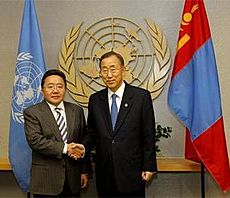
Vuk Jeremić, the President of the United Nations General Assembly, also congratulated Elbegdorj. He was happy with the fair election. UN Secretary General Ban Ki-moon also sent his congratulations.
European Commission President José Manuel Barroso said the election was a vital step for Mongolia. He noted it showed the country's commitment to democracy, law, and human rights. German Chancellor Angela Merkel also congratulated Elbegdorj. She noted that the Organization for Security and Co-operation in Europe observed the election for the first time. This showed Mongolia's growing democracy and openness.
Presidency
Elbegdorj won the Mongolian presidential elections twice: in 2009 and 2013. He was sworn into office on June 18, 2009, for his first term. For his second term, he was sworn in on July 10, 2013. Elbegdorj is the first Mongolian president who was never a member of the former communist party. He is also the first to have studied in Western countries.
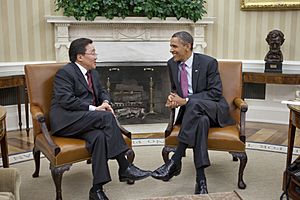
Inauguration Ceremonies
Elbegdorj's first inauguration was held at the State House on June 18, 2009. He gave a speech to the nation, and there was a military parade. The United States Senate passed a resolution supporting Mongolia's democracy on that day.
For his second term, Elbegdorj was sworn in on Sükhbaatar Square on July 10, 2013. This was the first time a Mongolian president took an oath in front of the public. He spoke to the nation, and a military parade followed. Nobel Peace Laureate and former Polish President Lech Wałęsa attended the ceremony.
Democracy and Human Rights Efforts
Leading the Community of Democracies
Elbegdorj was the chairman of the Community of Democracies from 2011 to 2013. This is a group of democratic countries. Under his leadership, Mongolia hosted a big conference for the group in April 2013. Important speakers like Aung San Suu Kyi and Tawakkol Karman attended. The conference had over 1300 people from more than 100 countries. They issued the Ulaanbaatar Declaration.
Elbegdorj led projects like "Zero Tolerance of Corruption" and "Education for Democracy." He spoke about these at the United Nations in 2011. He worked to strengthen civil society and democracy with other members of the group.
Promoting Democracy and Human Rights
Elbegdorj often gives talks about democracy and human rights. He has spoken in many places, including North Korea and Germany. He believes that "It is a human desire to live free that is an eternal power." He also said, "I truly believe in freedom for each and every individual." In 2013, he spoke with Nobel Peace Laureate Aung San Suu Kyi in Ulaanbaatar. She thanked him for supporting her release from house arrest in Myanmar. In 2010, Elbegdorj publicly asked Myanmar to free Aung San Suu Kyi, and she was released not long after.
In 2012, Elbegdorj started the Democratic Transition Assistance Foundation of Mongolia. This group helps other countries like Kyrgyzstan and Afghanistan with their democratic changes. It also supports economic reforms in countries like North Korea and Myanmar. The foundation uses Mongolia's own experience as a guide.
Elbegdorj and Korean President Lee Myung Bak started the Asian Partnership for Democracy in 2011. This project focuses on promoting democracy in Asia.
Elbegdorj has spoken out against violence in Syria and attacks on embassies. In 2011, he received the New York Democracy Forum's Presidential Medal. This award recognized his important role in Mongolia's democratic revolution. It also honored his support for other democratic movements.
In 2000, Elbegdorj founded Mongolia's Liberty Center. This group works for human rights, freedom of speech, and education.
Direct Democracy and Citizen Participation
In 2008, Elbegdorj opened the Citizens' Hall. This is a place where Mongolians can share their ideas on new laws. It is open to everyone in Mongolia. More halls have opened in other provinces. They help citizens and lawmakers work together before laws are made.
Elbegdorj believes that "Democracy is about empowering the people." He wants to give more power to local communities and businesses. He thinks that society grows when people have rights and can use them. He created a plan for decentralization. This means giving more power to local governments. He also created local development funds and financial support for local authorities.
His office organized training for citizens and local authorities. These trainings taught people how to be involved in local government spending. Elbegdorj believes that "citizen participation and monitoring are still missing in the public decision making."
Women's Rights
Elbegdorj has always supported women's rights. He believes more women should be in leadership roles in government. He noted that more women were elected in the 2012 Mongolian parliamentary elections. He said, "We need more women leaders. Women tend to see the whole picture." He also said, "If there were more women in power, I think we would have more harmony, more engagement and less suffering and less conflict."
In 2011, U.S. Secretary of State Hillary Clinton praised Mongolia for electing more women. She also applauded Mongolia for building a democratic system. Elbegdorj believes that public policies should reflect the kindness of mothers. In the 2013 Mongolian presidential election, Natsagiin Udval was Mongolia's first female presidential candidate.
Ending the Death Penalty
On January 14, 2010, Elbegdorj announced that he would pardon all people sentenced to death. He said that most countries had ended the death penalty, and Mongolia should do the same. He suggested changing death sentences to 30 years in prison. This decision was debated. Some people thought it was too early to end the death penalty in Mongolia.
Elbegdorj stated, "Capital punishment is wrong–it degrades human dignity. It brings no peace to society." He believes that the right to life is a basic human right. He said, "The state should respect very fundamental human rights, and secure them by law."
Despite some criticism in Mongolia, Elbegdorj's decision was praised internationally. Amnesty International said his actions showed a commitment to human rights. The organization "Hands off Cain" gave him the "Abolitionist of the Year 2011" award.
Finally, in 2012, the Mongolian parliament changed a law to join an international agreement. This made Mongolia officially committed to ending capital punishment. In 2016, President Elbegdorj continued to speak out against the death penalty.
Foreign Policy
Mongolia Hosts ASEM Summit
Under Elbegdorj's leadership, Mongolia hosted the 11th Asia-Europe Summit (ASEM 11) in Ulaanbaatar. This was the first time Mongolia hosted such a big event. Leaders from 51 countries, the European Commission, and ASEAN attended on July 15 and 16, 2016. The theme was "20 Years of ASEM: Partnership for the Future through Connectivity."
Elbegdorj said that Mongolia would be an active member of the international community. He emphasized that Mongolia would work to solve regional and global problems. He also said Mongolia would strengthen ties with its two neighbors and "third neighbors." "Third neighbors" are countries like the United States and European nations.
In 2015, President Elbegdorj spoke to the European Parliament. He called Mongolia a "strategic anchor" for the EU in the East. He said Mongolia would help promote shared values like peace and democracy in Asia.
Participation in UN Peacekeeping
As the leader of the Mongolian Armed Forces, Elbegdorj supported Mongolia's involvement in United Nations Peacekeeping operations. Since 2001, Mongolian soldiers have served in many peacekeeping missions. These include missions in Iraq, South Sudan, Afghanistan, and other countries. Under Elbegdorj's presidency, Mongolia became one of the top 20 countries contributing troops to UN peacekeeping missions in 2009.
Elbegdorj visited South Sudan on February 15, 2013, to support Mongolian soldiers. His visit was the first by a head of state from outside Africa to South Sudan. Elbegdorj's son, Erdene Elbegdorj, also served in the UN peacekeeping mission in South Sudan.
Elbegdorj stated that Mongolia would continue to help UN peacekeeping missions. He said Mongolia would host training for police and medical staff at its training center.
Nuclear-Free Status
Elbegdorj has made Mongolia's nuclear-free status a key part of its foreign policy. He also wants a nuclear-free world. The United Nations Security Council recognized Mongolia's nuclear-weapon-free status in 2012. This is important because Mongolia is close to nuclear-armed countries like Russia and China. Mongolia joined the Organization for Security and Co-operation in Europe in 2013.
In 2012, Elbegdorj was the first world leader to visit the Iranian nuclear facility in Natanz. After his visit, he said that Iran's nuclear program must be open to the world. He stressed that it must be watched by the United Nations and the International Atomic Energy Agency. He also said it should not threaten regional peace or other nations.
Elbegdorj is against storing nuclear waste in Mongolia. He has clearly stated, "We... firmly oppose to storing nuclear waste on Mongolian soil."
Foreign Investment Policy
Elbegdorj stated that he is open to working with "responsible, transparent and law-obedient investors." He wants investors who support Mongolia's development.
He also spoke about making legal changes to protect investors. He said, "Our goal is to change it from a system that serves those in power to one that serves the public." He added that "the people" also includes foreign investors.
The United States Senate passed a resolution in 2011 during Elbegdorj's visit. It supported the growing friendship between the U.S. and Mongolia. The resolution praised Mongolia's democratic reforms and efforts to be open and protect investments.
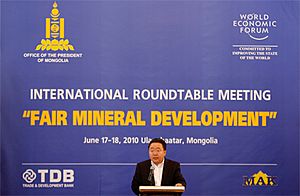
Elbegdorj helped organize a "Fair Mineral Development" meeting in Ulaanbaatar in 2010. This meeting focused on how to manage Mongolia's rich mineral resources fairly. It discussed transparency, taxes, and how to resolve disagreements. He also co-organized a second meeting in 2011. He said, "Supporting sustainable development and making the minerals sector beneficial to the people... are some of the issues of utmost concern."
Returning Dinosaur Fossils
In 2012, a nearly complete dinosaur skeleton was put up for auction in New York City. It was a rare Tarbosaurus T. bataar from Mongolia. Fossils found in Mongolia belong to Mongolia by law. Elbegdorj filed a lawsuit to get the illegally taken skeleton back. He won the case with the help of paleontologists. The U.S. authorities returned the fossils to Mongolia in May 2013. The skeleton was displayed in Sükhbaatar Square in Ulaanbaatar. This was the first time a Mongolian president filed a lawsuit abroad to get stolen items back. The person who sold the dinosaur fossil admitted guilt in the U.S.
Domestic Policy
Fighting Corruption
Elbegdorj's presidency focused on fighting corruption. He believes that "The true enemy of democracy and freedom is corruption." He said, "The worst theft is corruption which damages people's common rights and liberties." He thinks fighting corruption is one of Mongolia's most important duties. As prime minister, he had already worked to uncover corruption cases.
In 2009, Elbegdorj changed the Independent Authority Against Corruption (IAAC) council. He wanted it to focus on big political corruption, not just small cases. He reorganized the council with professional lawyers.
To stop corruption in the mining industry, Elbegdorj held a meeting in Ulaanbaatar in 2011. He worked with the World Economic Forum. The meeting brought together industry leaders and non-profit groups to discuss anti-corruption plans. He also encouraged Parliament to take action against corruption.
Elbegdorj sees Genghis Khan as a leader who fought corruption. He said Genghis Khan wanted equal protection under the law for everyone. "Chinggis... was a man who deeply realized that the justice begins and consolidates with the equality of law," Elbegdorj said.
Elbegdorj stated that "The crime called corruption is committed by public servants, and not citizens." He promised to end corruption. During his presidency, many corruption cases were investigated. Courts convicted high-level officials, including a former president. Mongolia's corruption ranking improved significantly from 2011 to 2012. U.S. Secretary of State Hillary Clinton praised Elbegdorj's efforts to end corruption in 2012.
Judicial System Reform
The President of Mongolia appoints judges for all courts. In April 2011, Elbegdorj held a "Judicial Reform and Justice" Forum. The Mongolian parliament passed new laws on judicial reform that Elbegdorj proposed in 2011. These laws aimed to make judges fair and to select new judges based on their skills. The reform also allows citizens to be part of court hearings. It requires all court decisions to be public online.
Protecting the Environment
The United Nations Environment Programme honored Elbegdorj as a Champion of the Earth in 2012. This was for his dedication to environmental protection. U.N. Secretary General Ban Ki-moon praised Elbegdorj's work on sustainable development and climate change. Elbegdorj was also a member of the World Economic Forum's Global Agenda Council on Climate Change in 2011.
On April 4, 2010, Elbegdorj declared a Tree Planting Day. He started a campaign to plant trees across the country. On this day, people plant trees to fight desertification in Mongolia. Many groups support his call to plant trees. He also ordered schools to include environmental subjects in their lessons. Students began planting and caring for trees around their schools. In 2011, Mongolians planted two million trees on Tree Planting Day. This became an annual tradition. His policy also includes environmentally friendly practices in the mining industry.
Elbegdorj invited the World Economic Forum-Water Resources Group to co-organize a conference in Ulaanbaatar in 2011. This meeting focused on protecting Mongolia's water resources. They discussed water use in mining, farming, and cities. As a result, Elbegdorj committed to forming a Mongolian Water Alliance. This group would help manage Mongolia's water supply. Elbegdorj said, "Managing our future water needs is key to sustaining Mongolia's economic growth."
President Elbegdorj attended the United Nations Climate Change Conference (COP21) in Paris in 2015. He spoke at the conference, which brought together leaders from 195 countries.
Smart Government Plan
Elbegdorj introduced the Smart Government platform on November 16, 2013. He defines "smart government" as using skilled people, technology, and good laws. The goal is to create a new way for government to serve citizens. It also aims to help private businesses grow. The Smart Government program wants to reduce government involvement in business. It also aims to strengthen property rights, update laws, and fight corruption. This will help Mongolia grow for a long time. The Parliament supported this plan.
The Smart Government Program has fifteen key goals:
- Improve government systems to match democracy and market economy values.
- Make sure government policies and actions are consistent.
- Improve public service and make people accountable.
- Make public service more efficient.
- Stop government from being involved in business.
- Keep politics free from business influences.
- Increase the fight against corruption.
- Support local businesses.
- Help the economy grow by protecting property rights and supporting private businesses.
- Create government structures based on law, allowing everyone to participate.
- Make sure contracts are honored.
- Support direct democracy, local government power, and local development funds.
- Create a long-term national development plan and make it law.
- Improve election laws.
- Use technology to make government more efficient.
Supporting Education
On May 20, 2013, Elbegdorj issued a decree. It directed the government to help Mongolian students study at top universities worldwide. Students accepted at the world's top 20 universities would get funding. Those at the top 100 universities would get funding for certain fields of study.
Elbegdorj refused a salary increase for himself. Instead, he proposed a law to give money to all Mongolian students studying in Mongolia. This law was passed. Since 2011, Mongolian university students have received monthly allowances.
Elbegdorj was also a member of the board of directors for the "Young Leader" foundation and the Mongolian Academy of Political Education.
Naming the 3 Millionth Citizen
In February 2015, Mongolia's population reached 3 million. A baby girl was born in Umnugobi province. President Elbegdorj called the parents to congratulate them. As a symbol of unity, he asked that the girl be named Mongoljin.
After the Presidency
After his presidency, Elbegdorj has continued to speak about Mongolia's future. He supports democracy and a market economy.
On September 23, 2022, Elbegdorj published a video. He criticized the Russian invasion of Ukraine and Russia's military draft. He asked Russian President Vladimir Putin to "stop this senseless killing." He praised Russians who protested and told Russian draftees not to "shoot Ukrainians." Elbegdorj also said that some ethnic groups in Russia were being used as "cannon fodder." He offered Mongolia as a shelter for Russians avoiding the draft. He also praised Ukraine and its President Volodymyr Zelensky.
Elbegdorj also shared an old Mongolian map on Twitter. This map showed parts of modern-day Russia as part of the Mongol Empire. He jokingly clarified that Mongolia would not invade Russia, as Mongolia is a peaceful nation.
On January 24, 2023, Elbegdorj helped set the Doomsday Clock. It was set to 90 seconds to midnight because of the war in Ukraine and the risk of nuclear weapons. He said the world faces many problems due to a "failure of leadership." He called for a group effort to achieve peace.
On August 31, 2020, Elbegdorj supported Chinese Mongols. They were protesting against China's decision to replace their language with Mandarin in schools. He spoke out in media and wrote a letter to Chinese President Xi Jinping.
Family and Personal Life
Elbegdorj met Khajidsuren Bolormaa in Ukraine when they were students. Their first son was born in Ukraine. They have helped over 300 orphans through their Bolor Foundation. They adopted twenty children from an orphanage in Ulaanbaatar. Now, they have twenty-five children: four of their own and twenty-one adopted.
Elbegdorj became the first president to dive to the bottom of Lake Baikal, the world's deepest lake. He did this in a mini-submersible on July 16, 2010.
In 2012, Elbegdorj asked his elder brother, Arslandorj, to leave his job. Arslandorj was a director in Ulaanbaatar's City Landscaping Department. He had worked there for over 20 years. Arslandorj was upset but followed his brother's request. Arslandorj said he had helped Elbegdorj during difficult times, especially during the 1990 democratic revolution.
Elbegdorj once tweeted that his eldest son, Orgil, was looking for a job in Mongolia. Orgil had a PhD in medicinal chemistry from the United States. He later found a job at a private pharmaceutical company in Mongolia. Elbegdorj's second son, Erdene, serves in the Mongolian Armed Forces. He was part of a United Nations peacekeeping mission in South Sudan from March to November 2013.
Awards and Honors
| Country or Institution | Award | Date |
|---|---|---|
| United Nations Environment Programme | Champions of the Earth - Policy Leadership | 2012 |
| 29 June 2011 | ||
| National Endowment for Democracy | New York Democracy Forum Presidential Medal | 22 September 2011 |
| Asia Society | Distinguished Statesmen Award | 15 June 2011 |
Honorary Degrees
| Country | School | Degree | Date |
|---|---|---|---|
| Hetman Petro Sahaidachnyi National Ground Forces Academy | Honorary Doctorate | 27 June 2011 | |
| Mongolian University of Science and Technology | Honorary Doctorate | 10 March 2014 | |
| Ritsumeikan Asia Pacific University | Honorary Doctorate | 22 May 2015 | |
| Hankuk University of Foreign Studies | Honorary Doctorate | 20 May 2016 |
Images for kids
See also
 In Spanish: Tsajiaguiin Elbegdorzh para niños
In Spanish: Tsajiaguiin Elbegdorzh para niños
 | Frances Mary Albrier |
 | Whitney Young |
 | Muhammad Ali |


